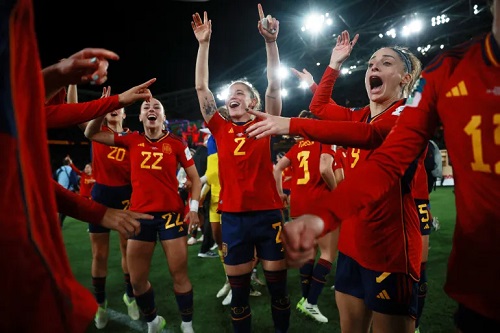Captain Olga Carmona scored the winner in the first half as Spain won the Women’s World Cup for the first time, beating England 1-0 in the final. La Roja, robbed of some of their best talent by a mutiny against coach Jorge Vilda only a few months ago and thrashed 4-0 by Japan in the […]Continue Reading
By Oluwakayode Banjo Super Falcons of Nigeria will today (Monday) face European Champions England in the round of 16 stage of the ongoing FIFA Women’s World Cup in New Zealand and Australia. The game will kick off at the Suncorp Stadium, Milton, Australia at half past eight in the morning. The second match of the […]Continue Reading
The prime minister is looking at plans to ensure all pupils in England study maths in some form until the age of 18. Rishi Sunak will announce the aim in his first speech of 2023 later, which he will use to set out his priorities for the year. It comes amid a winter of multiple […]Continue Reading
Health experts say patient safety cannot be guaranteed during strikes by ambulance workers in England and Wales. But, NHS England says emergency care will continue to be provided, as people are being asked to use services “wisely” and only call 999 in a life-threatening emergency – with 111 online as the first port of call. […]Continue Reading
The East of England Ambulance Service is taking up to 20 hours to reach some non-critical patients. Report says, the NHS service has also not been responding to some lower category calls due to pressures,as the service has been at “Surge White” for the past month, the highest alert level. Trust chief executive Tom Abell […]Continue Reading
Bukayo Saka’s breakthrough season with Arsenal has caught the attention of Nigeria as well as England boss Gareth Southgate. The 18-year-old has represented England the country of his birth at U16, U17, U18, and U19 levels, and is pushing for a first senior cap. However, he is of Nigerian heritage, and this week it was […]Continue Reading
Aare Muhammadu Buhari tí sọọ di mímọ fún olootu ìjọba ilẹ̀ Gẹ̀ẹ́sì Boris Johnson àwọn iṣẹ́ ìdàgbàsókè tó ń wáyé nílèyi, pàtàkì jùlọ labala ètò ọrọ ajé àti àgbékalè ètò náà. Àwọn aṣáájú méjèèjì lo ṣepàdé pò níbi apejopo ilẹ̀ Gẹ̀ẹ́sì pẹ̀lú ilẹ̀ Africa fodun 2020 èyí tó wáyé nilu London. Ààrẹ Buhari ṣàlàyé fún […]Continue Reading
